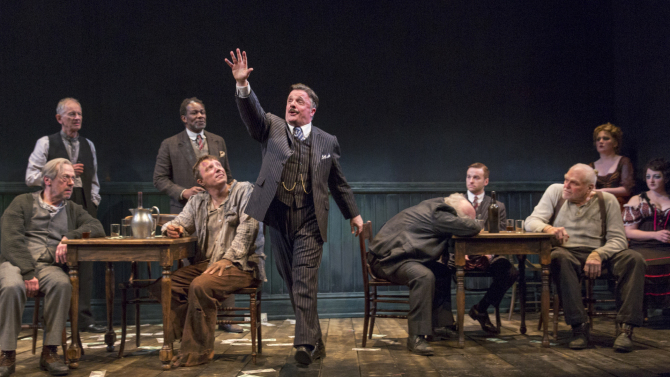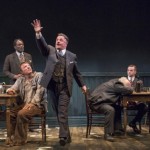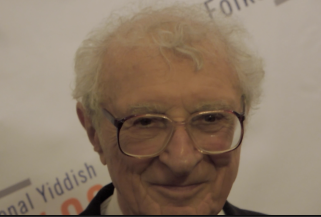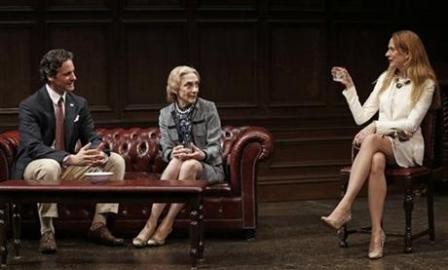Hope. It’s at the core of so many of our value propositions like the American Dream and religious faith. But what happens when we let go of Hope? What happens when we “give up the ghost,” as Hickman likes to say; or let go of our pipe dreams, as Larry recommends in The Iceman Cometh, now playing through March 15 at BAM’s Harvey Theater? Both suggest a kind of “freedom” is the result, but Hickey suggests it’s a liberating freedom, whereas Larry’s is despair and an endless wait for death.
The Iceman Cometh is Eugene O’Neill’s fascinating and complex study of hopelessness: a room full of drunks in a dank, dingy Greenwich Village bar, circa 1912, who sleep and wake through endless cycles of inebriation. Such places as these, where men’s souls went to die, were likely the locus of the soon to be successful Temperance Movement and the 18th Amendment, which abolished the sale and consumption of alcohol in the United States from 1920 until its repeal in 1933. We first meet Larry Slade (played as a stoic by the quietly dominant Brian Dennehy), a former Anarchist and worker’s rights advocate, as he’s being gifted an eye-opener by the barman. He begins to rouse the other sleeping drunks and soon the room is awash in arguments and discussions about their exaggerated pasts and delusional conjectures of their futures. All the while trying to wheedle free drinks. They are awaiting the arrival of Hickey, Theodore Hickman (Nathan Lane), an energetic salesman who passes through town periodically, relatively flush with cash. The party’s on when Hickey is in town, and there’s talk of a big birthday celebration in his honor.
The play is a fascinating, multi-layered, intricate tale of alcoholics at the end of their ropes. When Nathan Lane’s Hickey blows into town, he’s like Harold Hill in The Music Man, a holy con artist who promises them that they can restore themselves to their former glory: the gambler can open his casino again; the Harvard-graduated lawyer can re-start his practice; and the journalist can go back to his job on the beat. But there’s trouble right there in this River City, too, because Hickey is delusional. He’s not the functioning alcoholic they all saw in him, but a man who has thrown in the towel by murdering his wife, thinking it would liberate them both. Revealing the murder merely confirms and redeems Larry’s steadfast resistance to Hickey’s con. No one can be saved or have hope, Larry asserts: ““The lie of a pipe dream is what gives life to the whole misbegotten mad lot of us, drunk or sober.” No, Larry will stick with his disillusionment and leave hope to the suckers.
Largely due to its marathon-esque run time—four hours and 45 minutes, in this case—The Iceman Cometh is seldom produced. But the payoff for the hardy theater-goer is enormous, as this production, under the direction of Robert Falls, is absolutely transfixing. Midway through the second act (there are three intermissions), one simply forgets the play’s length. It is completely absorbing, thanks largely to an outstanding cast, in particular Lane, Dennehy and John Douglas Thompson’s (Joe Mott), seasoned pros who are at their best. Couple that with Kevin Depinet’s naturalistic and breathtaking sets (one of which features floors, light and perspective that looks as if it were lifted right from the Caillebotte painting, “The Floor Strippers” – and Natasha Katz’s often emotional and deeply moving lighting.
The Iceman Cometh is not a play to see casually. It requires not only a strenuous commitment of time and rear-end muscles, but a readiness for an emotional and intellectual challenge drawn out over several hours. The experience, however, is wholly rewarding, leaving one feeling fulfilled, accomplished and even educated by the end. To have the chance to see it may be rare, but it is certainly rarer still to see it performed so exceptionally. Serious theatergoers would be foolish to pass on this incredible opportunity.
The Iceman Cometh. Through March 15 at the BAM Harvey Theater (651 Fulton Street, Brooklyn). Four hours, 45 minutes with three intermissions. www.bam.org























